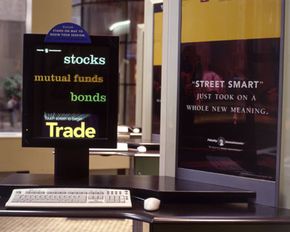
If there were a Hot 100 chart for investments, mutual funds would be in the top 10. Mutual funds are one of the most popular investment options for individual investors, and with good reason -- they help you increase your buying power and reduce your exposure to risk.
Advertisem*nt
In a mutual fund, an investment company gathers money from many individual investors and uses this pool of funds to purchase a wide variety of financial assets. It works a lot like your neighborhood stock club, but with more clout and more regulations. The investors own a share of the entire fund based on the amount of their investment.
It is estimated that more than eight out of 10 investors in the United States own shares in mutual funds. Why are mutual funds so popular? They have several advantages:
- Diversification: Your money and your risk are spread across many different asset classes.
- Professional management: Your investment benefits from the knowledge and experience of a professional fund manager, whose compensation depends on the fund's performance.
- Affordability: You don't need large amounts of money to invest, and the costs of buying and selling assets are low because you share them with other fund investors.
- Liquidity: It's easy to convert shares into cash.
Sounds good, doesn't it? Now, what if you took all that and made it tax-free? You wouldn't just have a top-10 hit -- you'd have a blockbuster smash, the sort of instant classic that can define an entire summer. Right?
Well ... maybe. Tax-free mutual funds have many of the same advantages as their taxable cousins. But they also have a few drawbacks, including lower earnings, proportionally higher fees and -- despite the name -- some tax liabilities. Read on to learn what goes into a tax-free mutual fund and if investing in one will help your portfolio go platinum.
The Beginnings of Mutual Funds
The idea of pooling money and spreading investment risk is not a new one. In the late 18th century, a Dutch merchant named Adriaan van Ketwich set up an investment trust called Eendraft Maakt Magf, or "Unity Creates Strength." This type of trust expanded to other European countries in the 19th century. It first appeared in the United States in the late 1890s.
Contents
- What is a Tax-free Mutual Fund?
- Investing in a Tax-free Mutual Fund
What is a Tax-free Mutual Fund?

There are more than 8,000 mutual funds in the United States. The income from most of these funds is subject to federal and state taxes [source: Investment Company Institute]. However, that is not the case with mutual funds that invest solely in tax-exempt municipal bonds. These funds are called tax-free mutual funds. However, to understand how tax-free mutual funds work, you need to understand how bonds work.
A bond is a type of contract issued by a corporation or a government body. That corporation or government body promises to repay borrowed money on a specified date and to pay interest to bond buyers. The bond's interest is paid periodically, often twice a year, and usually is set at a fixed rate. That means it cannot be changed, as variable interest rates can be.
Advertisem*nt
What are bonds generally used for? A bond is issued to finance day-to-day operations or special projects. It may be a short-term bond, with a term generally under three years, or long-term bond, with a term as long as 20 or 30 years.
Municipal bonds are issued by state, city or local governments. Because these government entities are not subject to federal tax, income derived from investing in municipal bonds is also free from federal taxes. Municipal bonds are usually free from state and local taxes as well, especially in the state where the bond is issued -- but not always. Therefore, you must make sure a municipal bond is free from all nonfederal income taxes before investing. Profits on the sale of municipal bonds may be treated as income. As a result, that income could also be subject to something called a capital gains tax.
Tax-free mutual funds invest only in municipal bonds. These funds use the combined monies of their investors to purchase bonds when they are issued. These bonds then pay interest periodically on the principal and return the full principal on a specified maturity date. Mutual funds continually replace older bonds that mature and make their payoff with purchases of new bond issues.
When you invest in a tax-free mutual fund, you are not investing in an individual bond. You are investing in all the bonds held by the mutual fund and receiving shares in the fund's total investments.
Is it time to invest in a tax-free mutual fund? Be careful, though: There are some potential pitfalls in store for the average investor. Read on to find out if tax-free mutual funds are right for you.
Bond Funds
A bond fund is a mutual fund consisting primarily of different types of bonds. Bond funds have become pretty common. In fact, bonds of all kinds total about 14 percent of the assets of mutual funds. According to the Investment Company Institute, municipal bonds account for about one quarter of all bond assets in mutual funds.
Advertisem*nt
Investing in a Tax-free Mutual Fund

Any investor would find tax savings on investment income appealing. However, before making any investment, you need to know your investment goals. Here are a few questions you might want to ask yourself:
- Do you want to provide income for your children's education?
- Do you need to save for your retirement?
- Do you want to travel?
- Do you want to buy a home?
- How much risk do you want to assume in your investments?
Discuss such questions with a financial adviser, accountant or other professional. You will then be able to decide if investing in a tax-free mutual fund can help you meet those goals.
Advertisem*nt
There are advantages and disadvantages to tax-free mutual funds. On the plus side:
- Tax savings on income. Taxes can eat up a significant portion of investment profits.
- Low risk. Your investment is relatively safe, since municipal bonds are backed by the government body that issues them.
- Liquidity. You may sell all or part of your investment at any time because your investment is in a bond fund instead of an individual bond. Here's why: The bond fund will pay you according to the per-share value of its investments at the time. On the other hand, if you owned an individual bond, you would have to wait until the bond matures to sell or find someone else to purchase the bond from you.
The most significant disadvantage to investing in tax-free mutual funds is a lower return on your investment. Municipal bonds have lower interest rates because they are tax-exempt. These lower interest rates mean a lower yield than you might expect to receive from investments in other types of mutual funds. However, wealthier investors in a higher tax bracket may find their lower returns offset by the tax savings.
Another downside to investing in tax-free funds is the fees and other expenses the fund charges to manage your investments and market the fund to potential investors. These charges are common to mutual funds of all kinds. However, due to the lower yield on tax-exempt bonds, these fees eat up a greater percentage of income than investments with a higher rate of return.
A mutual fund's prospectus can help you choose a fund. Armed with this data, you can make an informed investment choice.
If you'd like to know more about tax-free mutual funds and related topics, you can follow the links on the next page.
Mutual Fund Prospectus
Each mutual fund is required by the Securities Act of 1933 to prepare a prospectus, a legal document that describes the fund's management, services, past performance, fees, history and investments.
Advertisem*nt
Lots More Information
Related HowStuffWorks Articles
- How Capital Gains Tax Works
- How Tax Shelters Work
- How Income Taxes Work
- How do bonds work?
- How do mutual funds work?
- How Alternative Energy Mutual Funds Work
- How Precious Metals Mutual Funds Work
- Investing Quiz
More Great Links
Sources
- Ameriprise Financial. "Understanding Bonds and Their Risks." http://library.ameriprise.com/srl/amp/library_article.jsp?tid=0045 (Accessed 5/18/08)
- Brill's Mutual Funds Interactive. "Glossary: Mutual Fund Terms." http://www.fundsinteractive.com/glossary.html (Accessed 5/16/08)
- Financial Industry Regulatory Authority, Inc. "Bond Funds: Bonds versus Bond Funds." http://apps.finra.org/Investor_Information/Smart/Bonds/605000.asp(Accessed 5/18/08)
- Financial Web. "Mutual Funds." http://www.finweb.com/investing/mutual-funds.html (Accessed 5/16/08)
- Investment Company Institute. "Frequently Asked Questions About Bond Mutual Funds." http://ici.org/home/faqs_bond_funds.html#TopOfPage (Accessed 5/16/08)
- Investment Company Institute. "Trends in Mutual Fund Investing." http://www.ici.org/home/trends_03_08.html#TopOfPage (Accessed 5/16/08)
- Investopedia. "Mutual Funds: Introduction." http://www.investopedia.com/university/mutualfunds/default.asp?viewed=1 (Accessed 5/13/08)
- McWhinney, Jim. "A Brief History of the Mutual Fund." Investopedia. http://www.investopedia.com/articles/mutualfund/05/MFhistsory.asp (Accessed 5/16/08)
- The Securities Industry and Financial Markets Association. "What You Should Know: Selecting and Working with a Financial Professional." http://www.investinginbonds.com/learnmore.asp?catid=3&id+406 (Accessed 5/18/08)
- Tyson, Eric. Mutual Funds for Dummies. Hoboken, NJ: Wiley Publishing, Inc., 2007.
- U.S. Securities and Exchange Commission. "Invest Wisely: An Introduction to Mutual Funds." http://www.sec.gov/investor/pubs/inwsmf.htm (Accessed 5/16/08)